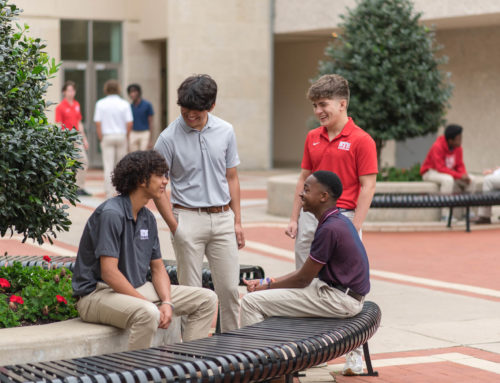When considering school options for your son, maybe you’ve wondered about the benefits of an all-boys option. This is a fine educational tradition that goes back generations, and for good reason: Single-gender education makes sense for a lot of students, and the positive aspects – educational, social, self-esteem and even spiritual – are many. Maybe it’s a tradition that’s right for you and your son.
Advocates believe single-sex schools empower students, boost self-confidence and allow students to excel in an environment free from potential distractions created by interacting with the opposite sex. In addition, it’s a statement of fact that boys and girls learn differently, so a boys’ school can customize their curriculum to reflect the different gender approaches to teaching and learning, recognizing physical, social, emotional and cognitive differences.
“Science has proven that each gender learns in a different manner, accelerating at different rates of learning with varying ability to process the information being presented. Teachers have mastered techniques that are tailored to meet the needs of each gender, and a single-sex school allows for those techniques to be used to their fullest potential.” – www.ThoughtCo.com, “The Advantages of an All-Boys School”
As reported in U.S. News and World Report, “In single-gender schools, boys are often more willing to take risks because they don’t feel the fear of failing in front of the other sex,” says Matt Albert, executive director of the Center for Reflective Communities in Los Angeles, which works to enhance the relationship between children and parents or caregivers. “Single-gender schools can establish more relaxed environments [and] less gender stereotyping, and courses can be tailored to student needs and interests.”
How Boys Benefit
“Schools that make the intentional choice to focus on the intellectual, physical, social, and emotional lives of boys and young men share an appreciation for the intensity and complexity of boyhood. Educators at boys’ schools celebrate and value all that it means to be a boy.” – The International Boys’ School Coalition, a global network of 200 leading schools for boys, www.theisbc.org.
The benefits of these schools may include:
- Specialized Curriculum: Boys private schools may offer specialized curricula that are tailored to the needs, interests and specific learning styles of male students. This can include courses that focus on topics such as leadership, character development, physical education and male-specific health education. Often, the selection of books and teacher techniques (hands-on learning, project-based work) are designed to better engage male students and their learning style.
- Reduced Distractions: Boys may experience fewer distractions related to social dynamics, relationships and competition for attention without the presence of girls in the classroom. This can create a more focused learning environment where boys can better concentrate on their studies, leading to greater confidence and self-esteem, which can positively impact academic performance.
- Emphasis on Character Development: Boys private schools may place a strong emphasis on character development, aiming to cultivate virtues such as integrity, responsibility and resilience. Catholic schools in particular focus on moral and faith values such as compassion, respect and service, which can lead to a sense of social responsibility and community engagement. Boys schools may also offer programs that promote leadership skills, teamwork and character education to help boys develop into principled individuals. Also, boys in single-gender schools may have access to male teachers and mentors who can serve as positive role models to students academically and spiritually on their journey through their formative years.
- Welcoming Environment for Healthy Competition: All-boy schools align their programs and extracurricular activities to fit the unique interests and talents of male students, including competition and teamwork, that develop a sense of belonging. Whether this takes place in the classroom, out on the athletic field or in clubs and activities, this is a natural part of male development. Competition in an all-male school gives boys a chance to shine in the classroom, where they can speak up, participate, showcase their talents and develop social connections.
- Strong Sense of Community: Boys private schools often foster a strong sense of community among students, faculty and families. Within this community of brotherhood, students learn to connect and communicate more deeply with their peers and teachers, so they can express their opinions and emotions without judgment. Community-building activities can also include traditions, ceremonies and events that promote a sense of belonging and camaraderie among boys.
Boys’ schools are not simply “schools comprised of boys,” but schools for boys, says Brad Adams, executive director of The International Boys’ Schools Coalition.
“They are designed in every way to respond to their needs, to harness their potential and to guide them along the journey towards full and responsible manhood,” he says.
It’s important to note that not all boys private schools are the same, and their specific characteristics and approaches to education can vary widely. It’s imperative that you research and visit different schools to find the one that aligns with your child’s learning style, educational goals, future plans and moral values.
Learn More About Us
At St. Thomas High School, a Roman Catholic college preparatory school for young men in grades 9-12 in Houston, Texas, we are focused on educating and enriching outstanding young minds during the most formative years of their lives. Through high-tech classrooms and state-of-the-art athletic facilities to the constant celebration of its rich and storied tradition, the diverse and welcoming St. Thomas community prides itself on providing the most fulfilling and well-rounded high school experience to inquisitive, ambitious and extraordinary young men. We foster a brotherhood for life.








